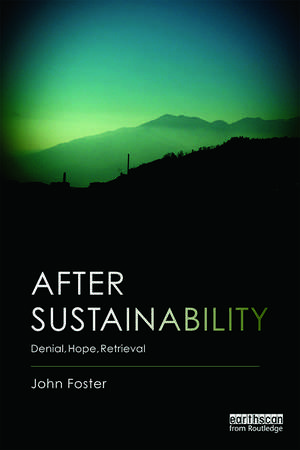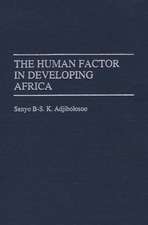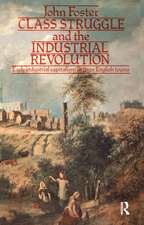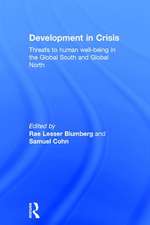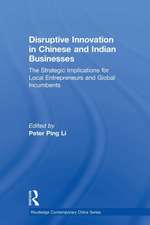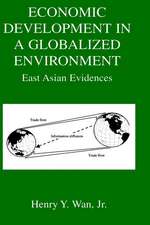After Sustainability: Denial, Hope, Retrieval
Autor John Fosteren Limba Engleză Paperback – 31 iul 2014
Some people still deny that it is happening. Others refuse to recognise that it is now too late to prevent it. But both these reactions spring from the same source: our pathological attachment to ‘progress’, of which sustainability has been one more version.
After Sustainability traces that attachment to its roots in the ways we make sense of ourselves. Original and accessible, this is philosophy on the edge, written for anyone who glimpses our environmental tragedy and cares about our future.
Does the challenge to stop pretending offer our only remaining chance? Read this book and make up your own mind.
| Toate formatele și edițiile | Preț | Express |
|---|---|---|
| Paperback (1) | 445.56 lei 6-8 săpt. | |
| Taylor & Francis – 31 iul 2014 | 445.56 lei 6-8 săpt. | |
| Hardback (1) | 1001.07 lei 6-8 săpt. | |
| Taylor & Francis – 23 iul 2014 | 1001.07 lei 6-8 săpt. |
Preț: 445.56 lei
Nou
Puncte Express: 668
Preț estimativ în valută:
85.27€ • 88.52$ • 71.10£
85.27€ • 88.52$ • 71.10£
Carte tipărită la comandă
Livrare economică 22 martie-05 aprilie
Preluare comenzi: 021 569.72.76
Specificații
ISBN-13: 9780415706407
ISBN-10: 0415706408
Pagini: 240
Ilustrații: black & white illustrations
Dimensiuni: 156 x 234 x 15 mm
Greutate: 0.36 kg
Ediția:New.
Editura: Taylor & Francis
Colecția Routledge
Locul publicării:Oxford, United Kingdom
ISBN-10: 0415706408
Pagini: 240
Ilustrații: black & white illustrations
Dimensiuni: 156 x 234 x 15 mm
Greutate: 0.36 kg
Ediția:New.
Editura: Taylor & Francis
Colecția Routledge
Locul publicării:Oxford, United Kingdom
Public țintă
General, Postgraduate, and UndergraduateCuprins
Prologue: the End of Pretending? Part 1: Denial 1. Varieties of Denial 2. Progress Past and Present 3. Progressivism Part 2: Hope 4. Environmental Tragedy 5. Structuring the Self 6. Natural Responsibility Part 3: Retrieval 7. Retrieving Wildness 8. Towards a Toolkit Coda: Can We Learn?
Recenzii
Timely but discomforting...examines the myth of progress and finds it wanting. It will help climate change deniers understand the issues. More importantly, it will help environmentalists, most of whom deny their own failure, to shift from a morally bankrupt optimism to a more realistic hope – with learning at its heart.
William Scott, Professor Emeritus, University of Bath and President of the UK National Association for Environmental Education
An understanding of the bind we are in, why 'sustainability' has failed to get us out of it, and what an honest alternative might be is long overdue. This book looks beyond false hope and strained optimism to what that future might look like. Necessary and important.
Paul Kingsnorth Poet, author and Director of the Dark Mountain project
Human societies continue largely to ignore the increasingly dire warnings coming from climate and other environmental scientists. Whether or not you agree with this book’s conclusions, it will make you think about the challenges and the scale of societal response that they demand. Such thought is currently in worryingly short supply.Paul Ekins Professor of Resources and Environmental Policy and Director, Institute for Sustainable Resources, University College London
'Foster's arguments are well researched and bear the careful citations of a trained academic. However, the audience here is not academics; rather, Foster suggests that everyone - climate change deniers, environmentalists, and those sitting on the fence - should consider the arguments and be very afraid of the conclusion. This reviewer agrees - because evidence suggests that the two-degree maximum will easily double or even triple, people should be very afraid indeed. Summing Up: Recommended' - R. C. Robinson, City University of New York, CHOICE April 2015
William Scott, Professor Emeritus, University of Bath and President of the UK National Association for Environmental Education
An understanding of the bind we are in, why 'sustainability' has failed to get us out of it, and what an honest alternative might be is long overdue. This book looks beyond false hope and strained optimism to what that future might look like. Necessary and important.
Paul Kingsnorth Poet, author and Director of the Dark Mountain project
Human societies continue largely to ignore the increasingly dire warnings coming from climate and other environmental scientists. Whether or not you agree with this book’s conclusions, it will make you think about the challenges and the scale of societal response that they demand. Such thought is currently in worryingly short supply.Paul Ekins Professor of Resources and Environmental Policy and Director, Institute for Sustainable Resources, University College London
'Foster's arguments are well researched and bear the careful citations of a trained academic. However, the audience here is not academics; rather, Foster suggests that everyone - climate change deniers, environmentalists, and those sitting on the fence - should consider the arguments and be very afraid of the conclusion. This reviewer agrees - because evidence suggests that the two-degree maximum will easily double or even triple, people should be very afraid indeed. Summing Up: Recommended' - R. C. Robinson, City University of New York, CHOICE April 2015
Descriere
Many practising environmentalists already suspect that it is now too late for sustainability. This book makes clear why that is true, but rather than despairing, it explores where coming out of denial could take us. It shows where the deep environmental crisis really lies, in the way we think about ourselves and our lives as much as in our material arrangements. This in turn suggests what we might be able to retrieve from breakdown.
